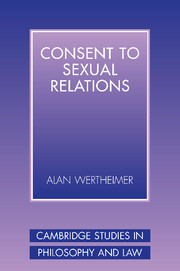Book contents
- Frontmatter
- Contents
- Preface
- Acknowledgments
- Abbreviations
- 1 Introduction
- 2 Law
- 3 The psychology of sex
- 4 The psychology of perpetrators
- 5 The harm and wrong of rape
- 6 The value of consent
- 7 The ontology of consent
- 8 Coercion
- 9 Deception
- 10 Competence
- 11 Intoxication
- 12 Sex and justice
- Appendix: Alphabetical list of hypothetical cases
- Index
6 - The value of consent
Published online by Cambridge University Press: 04 March 2010
- Frontmatter
- Contents
- Preface
- Acknowledgments
- Abbreviations
- 1 Introduction
- 2 Law
- 3 The psychology of sex
- 4 The psychology of perpetrators
- 5 The harm and wrong of rape
- 6 The value of consent
- 7 The ontology of consent
- 8 Coercion
- 9 Deception
- 10 Competence
- 11 Intoxication
- 12 Sex and justice
- Appendix: Alphabetical list of hypothetical cases
- Index
Summary
Up to this point I have not hesitated to use “consent” pre-analytically. We have a rough and serviceable idea of what it is to consent to sexual relations that is adequate for ordinary purposes. But we want a deeper analysis of consent, one that will enable us to understand the moral importance of consent, one that will help us to think about what counts as giving consent, and one that will distinguish valid from invalid consent; so it seems that we should turn to an analysis of the concept of consent.
A standard picture about the role of conceptual analysis goes something like this. We start with the principle that it is morally and legally impermissible to engage in sexual relations without the other party's consent. To determine which specific behaviors should be regarded as impermissible, we analyze the concept of consent (and related concepts). We ask, in effect, “when is it proper to say that someone consents to do X”? Given an answer to that question and given the premise, we can then say when sexual relations are morally and legally permissible.
This picture greatly exaggerates what a certain kind of conceptual analysis can do. The concept of consent provides a template that organizes and focuses our attention on a set of relevant moral issues, but it cannot do much more.
- Type
- Chapter
- Information
- Consent to Sexual Relations , pp. 119 - 143Publisher: Cambridge University PressPrint publication year: 2003



